When a Malaysiakini reporter gets arrested, questions arise as to whether this had anything to do with the expose in news reports about a cartel --- concerning the issue of migrant workers, that highlighted possible wrongdoings, or CRIMES, of not just third party agents/persons even an alleged 'Datuk' and also Public Officers...immigration officers. READ the media report below that was written by Nantha Kumar, published by Malaysiakini...Migrant workers: 'Employers' raking in millions through 'A to B' syndicate..'Datuk' mastermind behind new Pakistani cartel at KLIA?, etc...
Is NANTHA KUMAR, a Human Rights Defender and true JOURNALIST, who through his 'investigative journalism' exposed an alleged CRIME and/or wrongdoing? Is that the reason that resulted in him landing in the present predicament?
Or, is Nantha Kumar simply a criminal suspect?
Why is Nantha Kumar under REMAND Detention - He could have been released, and ask to appear when need be for the purpose of the Investigation. After all Najib and others were NEVER detained in lock-ups for the purpose of investigations? Immediately release Nantha Kumar - and continue investigations without detention...
Wonder whether MACC, police or law enforcement even investigated the matters raised in the media reports - It looks bad if MACC just targetted the one who highlighted the alleged crimes and wrongdoings - Maybe Azam Baki should tell us whether MACC is investigating the crimes exposed by Nantha Kumar and Malaysiakini - if not, why not?
The arrest of the Journalist raises DOUBTS - people who EXPOSE or Highlight crimes or wrongdoings should be supported - and not 'attacked' by State or Law Enforcement...
Crimes involving migrant worker syndicates, etc is not NEW
We recall that Zahid Hamidi was also charged for offences concerning migrant workers - where he was acquitted after prosecution failed to prove a Prima Facie case. Note, that the principle is that prosecution cannot charge anyone in court UNLESS they believe they have sufficient evidence to prove a Prima Facie case - and guilt beyond a reasonable doubt.
Then, the Prosecution, when the Attorney General/Public Prosecutor was filed an Appeal - It would have been BEST if the Court of Appeal did evaluate and review the High Court judge's decision to acquit, without Defence being called. Judges do make mistakes, and the Appellate Courts after hearing the Appeal would have CONFIRMED the High Court's decision, OR OVERTURNED the decision - meaning the case will be sent back to the High Court for the trial to continue.
But, the Courts were ROBBED of this opportunity, when our New Attorney General/Public Prosecutor DUSUKI, withdrew '...the prosecution's appeals against Datuk Seri Dr Ahmad Zahid Hamidi's acquittal from 40 charges of corruption in connection with the Foreign Visa System (VLN) two years ago...'
Zahid faced 33 counts of graft for allegedly receiving S$13.56 million (RM43.39 million) from UKSB to facilitate the award of a contract for a foreign visa system (VLN) and one-stop services (OSC) in China, and the extension of the contract to 2025. These charges were framed under Section 16(A)(B) of the MACC Act. - Edge, 5/10/2022
What happened to the Immigration Officer caught with the case of the '... immigration officer was caught napping with 12 foreign passports tucked inside his waistband....'
'When contacted, KLIA district police chief Azman Shari’at confirmed the report was lodged.“The case has been referred to the Immigration Department for further action,” he said. However, Immigration Department sources told Malaysiakini the officer was allegedly let off with a slap on the wrist.
How the need to CRIMINALIZE wrongdoings or 'crimes' of public officers - for, so long, they can escape by disciplinary measures, and not be prosecuted for CRIMES if convicted results in jail terms... the problem of PUBLIC OFFICERS continue to break the law continues...
Having worked at KLIA and several other airports for over two decades, he pointed out two key reasons why corruption remains rampant at KLIA.
“First, government officers are not afraid of punishment. Most of the time, those found guilty are only subjected to disciplinary action, such as being transferred to another department...
If a public officer breaks the law - it must be dealt with as a 'CRIME" not an employment misconduct. And, the crime must carry a DETERRENT sentence - also because it is committed by a Public Officer who must strictly follow and enforce the law, which is a expectation of public officers. A warning, a demotion, a salary cut, etc, or even a DISMISSAL simply won't do - if you break the law, you go to Jail, and maybe even your pension ought to cut???
Malaysiakini reporter B Nantha Kumar was detained late last night believed to be over an article on an alleged Pakistani cartel smuggling migrant workers into Malaysia.
An officer claiming to be from the MACC told the news portal that Nantha Kumar would be brought to the Putrajaya Magistrate’s Court for remand proceedings later this morning.
The officer also refused Malaysiakini’s request to speak to the reporter.
On Feb 22, Malaysiakini quoted a source claiming that a former immigration officer, who is now a “Datuk”, is the mastermind behind the alleged cartel operating at the Kuala Lumpur International Airport (KLIA).
Nantha has since been remanded for four days.
MACC chief Azam Baki denied that the journalist was arrested over the article Malaysiakini had published.
Instead, he said MACC officers had caught Nantha after he allegedly took a RM20,000 bribe from an agent that dealt with migrant workers.
The bribe was alleged to be a payoff so that two articles on the agent would not be published.
The agent then lodged a report with the MACC, leading to a sting operation. - Malaysiakini, 1/3/2025
Summary
A source claims a retired former immigration officer - now a “Datuk” - is the mastermind behind a new Pakistani cartel smuggling migrant workers into Malaysia.
His son is now working in the Immigration Department, the source says.
Agents on the ground identify a Pakistani national as one of the most powerful figures in the syndicate.
A former Immigration Department officer, who is now a “Datuk”, is the mastermind behind the new Pakistani cartel responsible for smuggling migrant workers into Malaysia, according to a source.
“This Datuk is a former immigration officer. After retiring, he began working with Pakistani agents to run syndicates, particularly for the ‘A to B’ project,” said the source who is from the Immigration Department headquarters in Putrajaya.
“Although he is not directly involved, he plays a crucial role for the Pakistani agents by arranging migrant worker quota approvals and handling dealings with the department.
“He even owns several companies that exist only on paper to facilitate the ‘A to B’ syndicate,” the source added, revealing that the Datuk’s son is serving in the Immigration Department as well.
The “A to B” syndicate involves “employers” registering their companies with the Companies Commission of Malaysia, obtaining large quotas for migrant workers, and selling these quotas to third parties at prices ranging from RM4,500 to RM5,500 per worker.
Previously, the migrant worker syndicates involved Bangladesh and China.
However, a recent investigation by Malaysiakini at Kuala Lumpur International Airport (KLIA) found that the syndicate responsible for smuggling migrant workers into Malaysia is now monopolised by Pakistani agents.
Pakistani agents dominate
A local agent familiar with the syndicate told Malaysiakini that Pakistani agents have begun to dominate KLIA, particularly at Terminal 1.
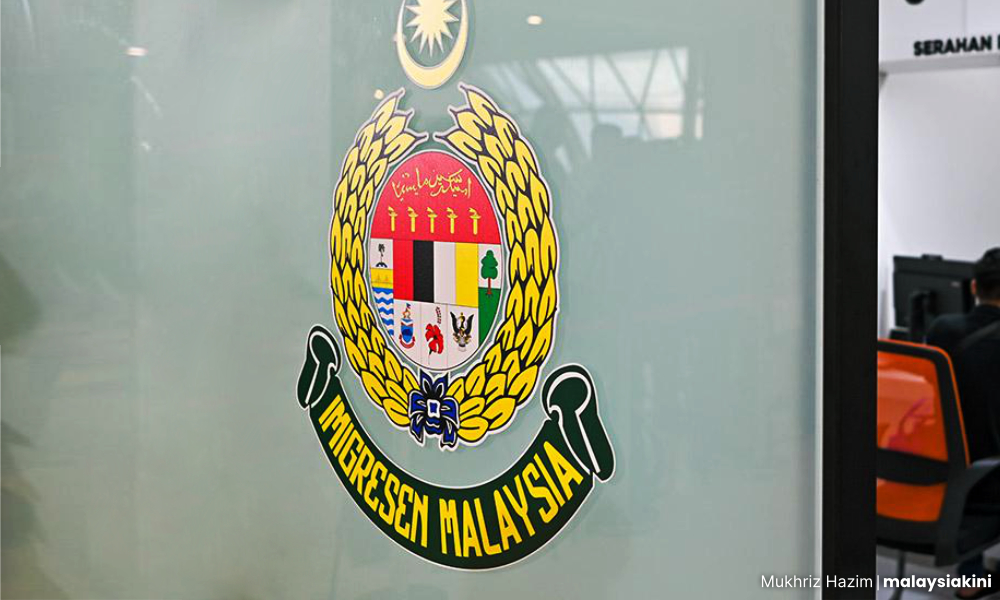
“There are a few reasons why Pakistanis are starting to ‘control’ KLIA. We all know that the government now allows Chinese nationals to use the ‘autogate’ system to enter or leave Malaysia.
“Because of this, agents find it harder to work with Chinese nationals. There’s no reason for agents to ask for money from the Chinese by claiming they need to pay the Immigration Department.
“As for Bangladeshis, we all know there have been many reports about human trafficking involving Bangladeshi nationals coming into Malaysia. As a result, authorities in both countries have tightened entry regulations for Bangladeshis.
“I’m not saying the Bangladeshi syndicates are gone, but the Pakistani syndicates are now more dominant,” the agent said on condition of anonymity.
Passport snooze scandal
Recently, Malaysiakini reported that an immigration officer was reported to the police for possessing 12 foreign passports allegedly linked to the “Fly” syndicate.
According to the report, the officer was involved in the syndicate by handling around 30 passports daily from Pakistani agents, with each “fly” passport fetching RM1,400.
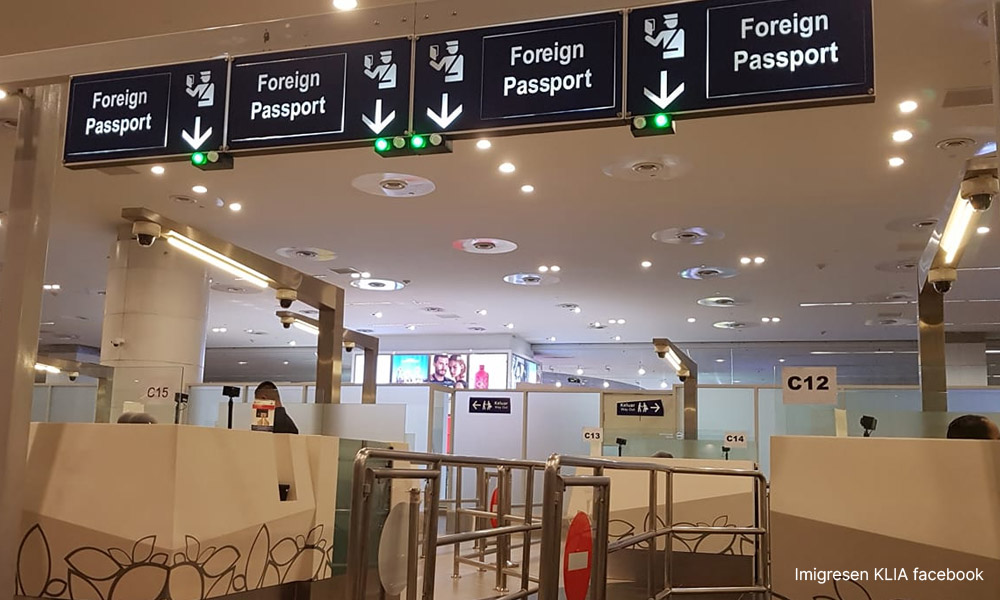
Several agents on the ground identified a Pakistani national known as “Asif” (a pseudonym) as one of the most influential figures among the Pakistani agents.
“There are many agents on the ground, but Asif is one of the most powerful, and he is protected by the Datuk. I don’t know his real name, but among agents and KLIA officers, he is known as Asif.”
Asif is married to a local woman and is living in Malaysia on a social visit pass.
The source added that aside from the “counter setting” and “Fly” syndicates, Asif is also involved in the “A to B” scheme.
“The Datuk sets up companies and obtains quota approvals, while Asif brings in migrant workers from Pakistan,” the agent explained.
READ MORE: Migrant workers: ‘Employers’ raking in millions through ‘A to B’ syndicate
Zahid the ‘runner’
According to sources, another Pakistani national, known as Zahid (a pseudonym), is Asif’s right-hand man at KLIA.
“Zahid acts as a ‘runner’ on the ground, finding clients for the ‘Fly’ syndicate. He is the one who handed over the passports to the immigration officer who was recently reported to the police for possessing 12 foreign passports.
“He not only handles Pakistani passports but also works with syndicates involving nationals from Arab and African countries,” the source said.
“One reason he is so influential is that he previously served three years in prison in Malaysia for human trafficking.
“Under Malaysian law, foreign nationals involved in criminal activities are banned from re-entering the country. But Zahid is still here, using a professional pass,” said an agent.
The “Fly” syndicate refers to a scheme that falsifies immigration status, clearing overstayers or blacklisted individuals by using fake exit and entry stamps.

Previously, immigration officers would secretly take exit stamps to specific locations and stamp passports provided by agents before collecting payments.
Now, syndicates reportedly use immigration officers who personally bring agent-provided passports to counters for official stamping before returning them.
Additionally, Malaysiakini discovered that a cooperative operating in Pahang had sold its migrant worker quotas to Pakistani agents.
According to sources, the Pahang cooperative was granted approval to hire 1,125 migrant workers for the plantation sector.
“However, to my knowledge, the cooperative only employs about 200 migrant workers for its own use.
“The rest of the quota is sold to a migrant worker agency based in the outskirts of Kuala Lumpur, which then sells it to third parties,” the source said.
The agency is reportedly owned by an Indian national known as George (a pseudonym), who sold nearly all the quotas to Pakistani agents at prices ranging from RM6,400 to RM6,800 per worker.
“In the past, plantation sector quotas were usually sold to Bangladeshi or Indian agents. Now, Pakistani agents are taking over,” the source added.
Going undercover
Malaysiakini has previously reported on this cooperative’s involvement in the “A to B” syndicate.
A Malaysiakini journalist went undercover as an agent and met with a representative of the agency in Kuala Lumpur recently.
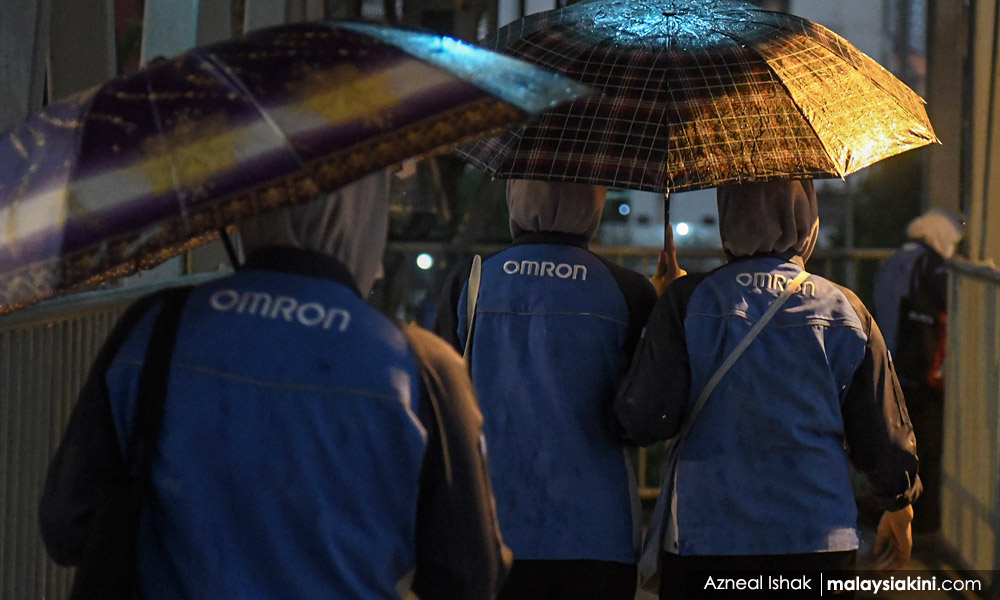
During the investigation, at least 200 quotas were found to be available for sale.
Initially, the agent quoted RM6,800 per quota but later reduced the price to RM6,400 after negotiation.
However, when contacted, George denied the allegations.
He claimed that the agency was merely assisting the cooperative in bringing in migrant workers for its plantations. - Malaysiakini, 22/2/2025
Summary:
Migrant worker syndicate: The "A to B" syndicate exploits government hiring systems by obtaining excessive migrant worker quotas, which are then sold or rented to other industries for profit.
Lucrative operations: Syndicate members earn millions from quota sales and renewing workers' permits. The scheme includes charging employers fees while underpaying workers. Some individuals manage thousands of workers, leveraging political connections or forged documents to secure quotas.
Challenges in enforcement: Despite government restrictions and actions, the syndicate continues due to lenient penalties for colluding officials and systemic corruption.
EXCLUSIVE | When discussing migrant workers, we often hear two conflicting narratives. One side claims there is an oversupply of migrant workers, while the other insists there’s still a labour shortage.
So, who is telling the truth, and who is lying? Technically, both sides are correct.
How so? The answer lies in the "A to B" syndicate that trades migrant workers. Under this syndicate, individuals calling themselves "employers" hold quotas for thousands of migrant workers despite not needing them.
These so-called employers would apply for quotas from the government solely to "sell" or "rent" their migrant workers to others - a lucrative scheme that generates millions of ringgit.
They are exploiting the government's migrant workers hiring system by supplying labour to industries that are facing shortages or to sectors where migrant worker recruitment has been frozen by Putrajaya.
Malaysiakini learned that this syndicate began its activities in 1996 and was purportedly unstoppable with the help of corrupt law enforcement officers.
While several civil servants have been caught for colluding with the syndicate over the years, many of them only got a slap on the wrist with punishments such as getting transferred to another department, which was considered mild in comparison to the hefty bribes they received.
Checks reveal that each of the "employers" can earn hundreds of thousands of ringgit from selling off workers' quotas and renewing their Temporary Employment Visit Passes (PLKS) every year.
What is the ‘A to B’ syndicate?
According to sources who used to be involved with the syndicate, these "employers" are registered companies under the Companies Commission (SSM).
By holding large migrant worker quotas, they sell the quota to third parties at rates ranging from RM4,500 to RM5,500 per worker. The price would depend on which sector that wants to hire them.
"For instance, if an employer sells 1,000 quotas, they can make RM5.5 million.
"After deducting payment for levies, insurance, and other fees, they still get a net profit of between RM2.5 million to RM3 million," the source told Malaysiakini.
On top of this, the source said, the syndicate also makes money from renewing PLKS for the workers, which is an annual requirement. They would charge between RM1,000 and RM2,000 for each worker, it was claimed.
"The third-party employers that purchase these quotas still need the 'original' employers' help to renew PLKS, because the latter are the ones listed in the Human Resources Ministry and Home Ministry's database,” the source added.
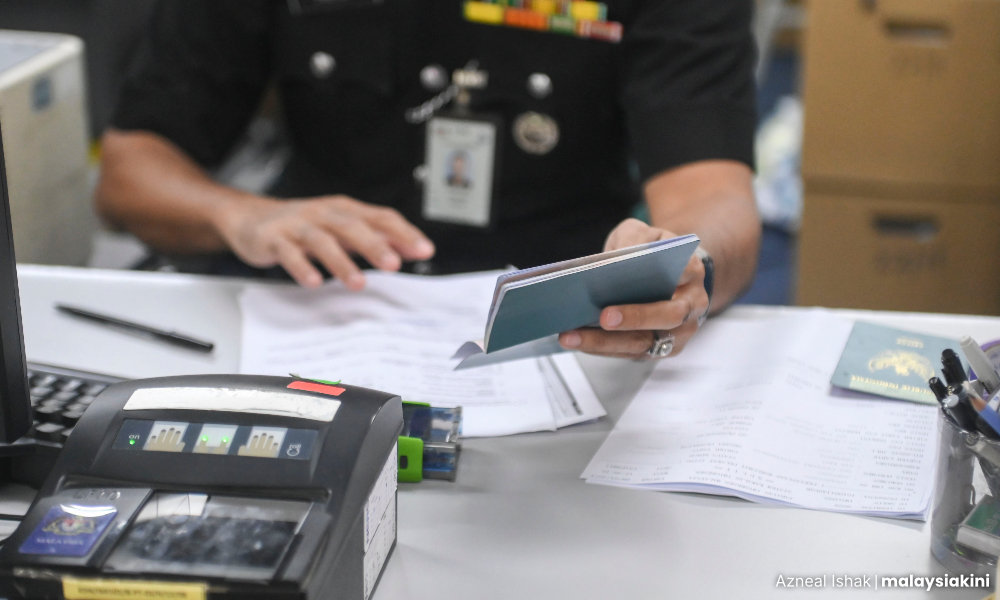
The syndicate can allegedly generate a stable income for up to 10 years for every PLKS they hold.
Thus, the source pointed out that an employer who holds 1,000 permits can earn at least RM10 million in the period.
"Making money in Malaysia is so easy," said the source, who has since quit the scheme after being cheated by an employer.
‘Renting’ workers
According to sources, most of those involved in the syndicate are foreigners, mainly from Bangladesh, Pakistan, and India.
These individuals would marry local women and start businesses under their wives’ names, often donning the “Datuk” title to bolster their credibility with prospective employers.
Another source who is still active in the migrant worker trade revealed another modus operandi by the syndicate, where “employers” with PLKS quota would “lend” their workers to sectors where migrant worker recruitment has been frozen.
This is done by charging the desperate employers a certain amount of fees for the service of each migrant worker. The syndicate, often referred to as Employer A, would then use the fee to pay a lower wage to the workers and pocket the rest themselves.
For example, Employer A can charge Employer B a fee of RM2,500 per worker a month, but they would only pay the workers RM1,800, which allows them an instant profit of RM700 per head.
"So, for an employer that has 1,000 workers, they can easily make about RM700,000 a month,” the source said.
Marrying local women
However, the actual number of quotas that an employer involved has is usually more than 1,000.
Based on Malaysiakini's investigation, where our journalists went undercover as “Employer B” to seek migrant workers from the syndicate, it was learned that some employers were managing as many as 6,000 migrant workers.
One of them is a Bangladeshi national who holds permanent resident status (MyPR) and is known as a “Datuk Seri”. This employer is known to be married to two local women and live in Shah Alam, Selangor.
Through the A to B syndicate, it was learned that he earns nearly RM1.8 million a month. On top of this, he also earns between RM5 million and RM6 million a year from PLKS renewals.
Another employer met by Malaysiakini is a Pakistani national with the title Datuk, who manages 2,000 workers. Based in Kuala Lumpur, he is involved in the cleaning and mini-market sectors.
How do they obtain large quotas?
According to a licensed agent, there are two common ways that employers involved in the A to B syndicate would use to secure migrant worker quotas.
The first one, he said, is by leveraging close connections with politicians to gain access to relevant ministries.
Secondly, they would use forged documents and bribe public officials with a payments ranging from RM500 to RM1,000 per worker.
The private licensing agent explained that many syndicate members have "insiders" within the Home Ministry and Human Resources Ministry, which are directly responsible for migrant worker recruitment.
"Sometimes they would also engage middle persons, such as relatives or friends of politicians.
"They would pay these people once they get the permits approved," the agent claimed.
However, according to the agent, he noticed that such activities have declined since the new government came into power.
"I’m not saying the syndicate is gone, but it’s reduced now."
Quotas of 9,999
Malaysiakini's investigation also found several cases where certain employers received an enormous number of migrant worker quotas, including one where permits for 9,999 migrant workers were granted to a plantation company based in Kuala Lumpur.
The approval was issued on Nov 17, 2022, about a month after then-prime minister Ismail Sabri Yaakob dissolved the Parliament.
Government policy states that plantation companies are eligible for quotas of 9,999 migrant workers if they own, rent, or lease at least 3,330ha of land.
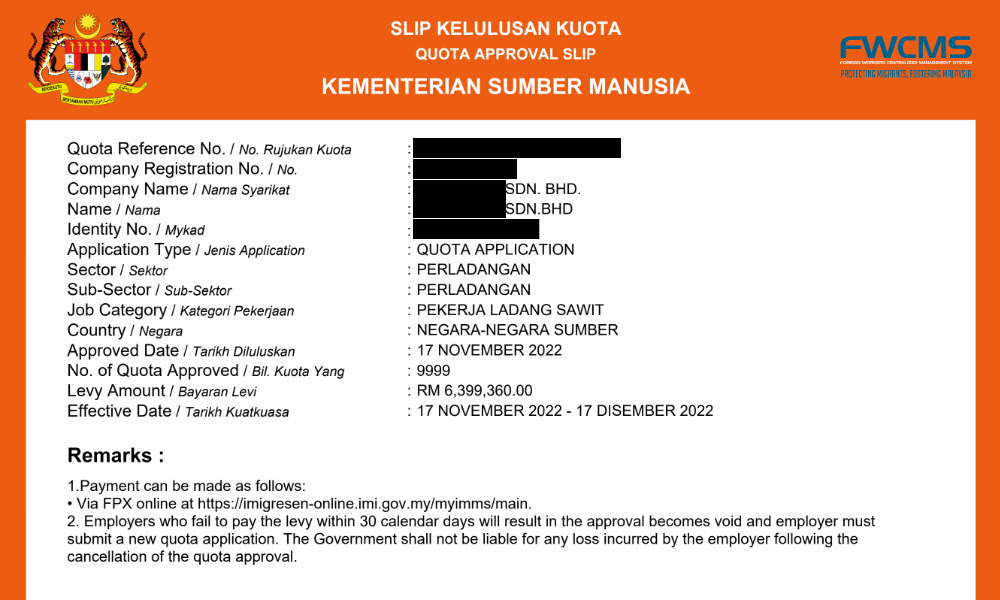
However, checks with government agencies revealed that this company did not own large plantations.
Instead, the investigation revealed that the company is owned by a family from Pahang, with the husband, wife, and their children listed as its directors.
According to an agent, the wife attempted to sell their quota at RM6,400 per worker. She also allegedly asked for a deposit of RM2 million to be paid upfront.
"No one dared to buy it because the total cost would exceed RM64 million," the agent said.
According to the agent, the company then failed to acquire the quota as they could not pay government levies, amounting to RM6.4 million, as no one was willing to pay them.
"How could this company get approval if they couldn’t even afford to pay the levy? Did the approving officials fail to check the company’s background?” the agent questioned.
The agent also revealed that the woman allegedly managed to acquire her quota for 1,500 workers for the service sector (retail and wholesale).
This was instead the fact that no retail chains in the country require such a huge number of migrant workers, the source claimed.
"But she could get approval. This, too, she could not pay the levies before the approval was rescinded," the agent said.
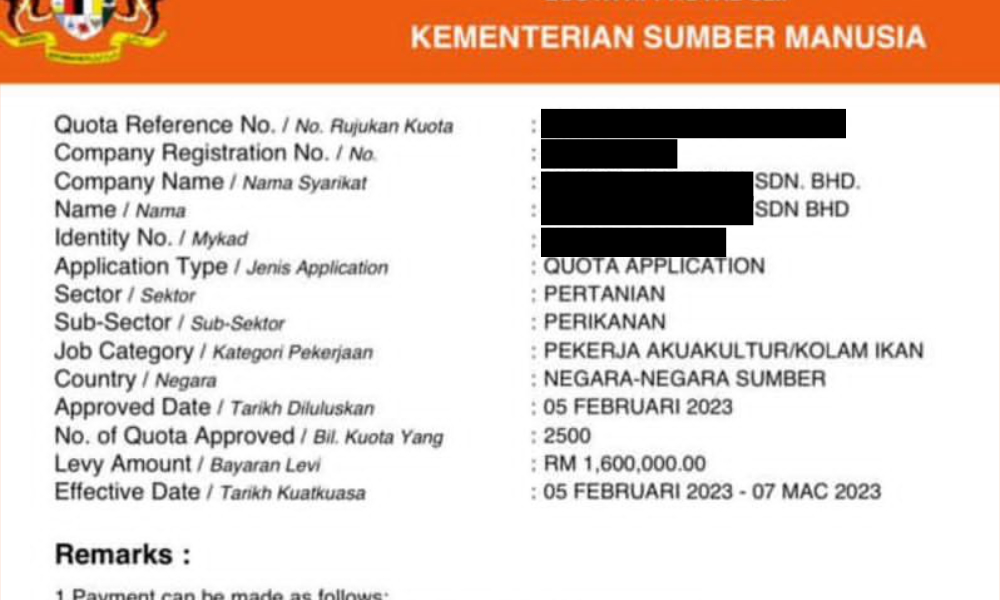
Malaysiakini also discovered that a fishing company in Kampar, Perak received approval for 2,500 migrant workers in the agriculture sector.
The approval was obtained on Feb 5, 2023, when the government introduced the Foreign Worker Employment Flexibility Plan. Prime Minister Anwar Ibrahim had just come into power for about three months then.
On Feb 8, 2023, the Fisheries Department issued a statement, saying 10,000 migrant workers were being employed onboard 3,000 licensed fishing vessels in the country, based on November 2022 statistics.
It projected that some 17,486 migrant workers would be needed to fill demand in the sector in Peninsular Malaysia in the first quarter of 2023. Up to then, a total of 10,063 PLKS have been approved for foreign fishing crews.
This means that the need for migrant workers in the sector then was only around 7,400. Ironically, from this number, about 33 percent of the quota was given to one company.
More surprisingly, the company has also failed to pay the levy before the approval was cancelled.
Syndicate still active
Despite the government having frozen foreign worker recruitment on March 18, 2023 (with exceptions for certain sectors), the syndicate has allegedly remained active.
Recently, a cooperative in Pahang received approval to recruit 1,125 migrant workers for the plantation sector.
The cooperative then collaborated with a migrant worker agency based at a location on the outskirts of Kuala Lumpur.
The agency’s owner, who is an Indian national, claimed they were merely assisting the cooperative in bringing workers for its plantations.
"We’re not involved in the A to B syndicate. We’re just helping the cooperative,” the owner told Malaysiakini.
However, when Malaysiakini journalists went undercover as recruitment agents, they found that at least 200 quotas were available for sale.
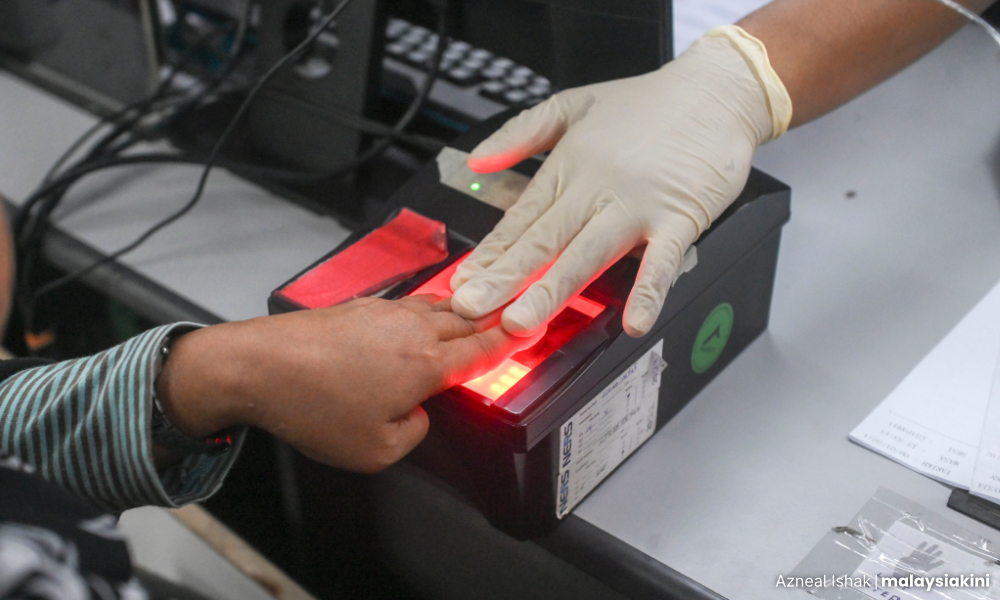
Initially priced at RM6,800 per quota, the agency eventually reduced the price to RM6,400 after negotiations. They also asked for an upfront payment of RM150 per quota.
Why can’t the syndicate be stopped?
Former officials from the Immigration Department and Human Resources Ministry have agreed that the syndicate would continue to exist as long as there are civil servants willing to collude with them.
Furthermore, they said, the mild punishment for those caught working with the syndicate is not deterrent enough to stop them.
"We often read about employers not paying migrant workers or agents arrested for ‘human trafficking offences'.
“But how could this be made possible without the complicity of public officials? And what punishments do these officials face?” asked a former immigration officer.
In most cases, he said, those caught would only be transferred to other departments as a punishment.
"For instance, let's say I am involved and then when I get caught, I will only be transferred. The new officer who replaces me will continue the activity.
"All I need to do is introduce the agents and ‘employers’ to my replacement, and I’ll continue receiving my ‘share’ (bribes),” the former officer said.
Malaysiakini also found that often those prosecuted are only the low-ranking officials, while the higher-ranking ones always get away scot-free.
"You’ve probably heard of this case where a senior official was transferred after being implicated in corruption, only to be promoted to secretary-general less than a year later.
"This is just one example. There are dozens of such cases," he added. - Malaysiakini, 19/11/2024
Summary
A KLIA immigration officer was found asleep with 12 foreign passports hidden in his waistband.
He is allegedly involved in a passport syndicate but purportedly faced minimal disciplinary action.
Alleged corruption at KLIA is linked to weak punishments and low government salaries.
An immigration officer was caught napping with 12 foreign passports tucked inside his waistband.
According to a police report dated Jan 7, an immigration officer said she spotted her colleague sleeping in the meeting room of the Terminal 2 operations office at the Kuala Lumpur International Airport (KLIA).
“Since it was not break time and was close to the shift change at 7.30am, I decided to wake the officer. Upon arriving at the meeting room, I found the officer lying on a chair in full immigration uniform.
“Since the uniform was not worn properly, I noticed a book resembling a passport tucked into the waistband of the officer’s pants. I immediately woke the officer and conducted an initial inspection. As a result, I found 12 passports from various countries hidden in the waistband.

“I then took the passports and reported the matter to the head of immigration at Terminal 2,” read the police report sighted by Malaysiakini.
When contacted, KLIA district police chief Azman Shari’at confirmed the report was lodged.
“The case has been referred to the Immigration Department for further action,” he said.
However, Immigration Department sources told Malaysiakini the officer was allegedly let off with a slap on the wrist.
Malaysiakini has repeatedly contacted the Immigration Department for comment but has yet to receive a response.
According to sources, the 29-year-old officer was purportedly transferred to the KLIA detention depot but has yet to report for work.
“He is still involved in passport ‘fly’ activities, where he collects passports from agents and hands them over to immigration officers at KLIA to be entered into the system and stamped.
“He receives around 30 passports from a Pakistani agent daily, with each ‘fly’ passport allegedly fetching RM1,400,” said a source from Putrajaya’s immigration office.
“Fly” refers to a syndicate operation that manipulates entry and exit records to “clean” overstayers’ statuses or remove blacklist records for foreign nationals through fraudulent passport stamps.

Previously, immigration officers involved in such activities would smuggle out an official stamp, meet the agent at a designated location, and stamp all the passports provided by the agent in exchange for money.
However, now the officers take the passports to the counter, stamp them, and then return them to the agent.
‘Corruption and KLIA are inseparable’
A former KLIA staff member told Malaysiakini that the airport is an alleged “goldmine” for syndicates.
“Corruption and KLIA are inseparable. In fact, I can say that almost every day, there are various syndicates operating, such as those involving foreign nationals and gold smuggling.
“KLIA is not immune to migrant worker syndicates and corruption. Even though the government and enforcement agencies like MACC have taken various measures to combat corruption, they have failed,” the former staff said on condition of anonymity.
Having worked at KLIA and several other airports for over two decades, he pointed out two key reasons why corruption remains rampant at KLIA.
“First, government officers are not afraid of punishment. Most of the time, those found guilty are only subjected to disciplinary action, such as being transferred to another department.
“Secondly, low salaries among government employees. Just imagine - what job opportunities does a low-ranking immigration officer have after retirement?
“The only thing he knows is immigration work. So naturally, he will try to make money by becoming a middle-person,” he added. - Malaysiakini, 19/2/2025





No comments:
Post a Comment